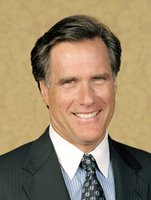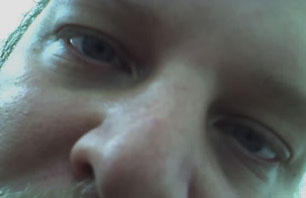 Mitt Romney, governor of Massachusetts, and a Mormon, is one of the front runners for the Republican Presidential nomination in the 2008 elections. Andrew Sullivan started off quite a stir when he said (paraphrased), "If a candidate for office is religious, I welcome him without questioning about his religion. If a candidate for office says his religion will dictate how he governs, then... well... I do have a few questions about his religion." Here is a great quote from Sullivan to sum it up:
Mitt Romney, governor of Massachusetts, and a Mormon, is one of the front runners for the Republican Presidential nomination in the 2008 elections. Andrew Sullivan started off quite a stir when he said (paraphrased), "If a candidate for office is religious, I welcome him without questioning about his religion. If a candidate for office says his religion will dictate how he governs, then... well... I do have a few questions about his religion." Here is a great quote from Sullivan to sum it up:Of course, the subject eventually moved to the discussion about Mormon underwear. (Not because Andrew wanted to know what would happen to America if the President wore faith-based boxers, but because he simply didn't know about it previously, and thought it was interesting.) That of course led to Mormons basically saying, "We don't talk about those things.""For my part, I'm uninterested in Romney's personal religious practices. But I am concerned that Romney believes that America had a "divine founding". When? Does he mean the Declaration of Independence? Does he mean the period when Mormons believe Jesus arrived in America and hung out for a while shortly after the resurrection? Or when exactly? A person's private faith is irrelevant to me. But if it means he holds that one country on earth has a special divine founding, then that has serious ramifications for foreign policy, at the very least. Could someone fill me in on what Romney may mean by America's "divine founding"? Obviously Washington and Jefferson weren't gods (although Mormons believe they now could be, right?) So what role did the Mormon God play in founding America? This is an important question for understanding a potential president's political philosophy. And since the theocons believe in bringing religious doctrine into the public square as a basis for political decisions, and Romney is the theocon candidate, how can they object to the dialogue?"
Anyway.
I grew up near Palmyra (where Joseph Smith, founder of the Mormon church grew up), and went to the Hill Cumorah pagent there (performed upon the hill on which the golden tablets were found). I enjoyed the show, and found it interesting... but in the same way I found studying the Greek pantheon interesting. Mormonism is a religion that, the more you know about it, the more you discover how vastly different it is from Christianity, which is a fact that most people don't realize.
That brings us to a new series put out by (liberal comedian playing the part of Conservative blowhard and rabble-rouser) "Jesus' General JC Christian", which explores some of Mormonism's more interesting facets.
Now, if anybody wants to complain to me (or JC Christian) about poking fun at Mormons, hold your breath: Nobody is making this stuff up. Nobody is embellishing the facts. Nobody is passing judgment. The only leaps of logic that are occurring are that: (1) the writings of the Mormon faith say X, Y, and Z; (2) all good Mormons believe the writings of the Mormon faith; (3) Mitt Romney is a good mormon.
So, when we say that Mitt Romney believes that "God lives on a planet near a star called Kolob." That's a perfectly fair logical conclusion based on the fact that he is a Mormon.
 And, just to add: I don't care what your opinion is regarding Mormon teachings. If you ever find yourself near Rochester, New York, then go check out the Hill Cumorah pageant. It's a pretty cool thing to see, its free, and I promise you will enjoy it immensely.
And, just to add: I don't care what your opinion is regarding Mormon teachings. If you ever find yourself near Rochester, New York, then go check out the Hill Cumorah pageant. It's a pretty cool thing to see, its free, and I promise you will enjoy it immensely.As for any truth in religion, I could care less. My opinion is that if a religion makes all of its followers generally nicer, more prone to help the unfortunate, and more peaceful and tolerant, then it is a good religion. If a religion makes certain of its members generally more close-minded, ignorant, intolerant and violent, then it is a bad religion.




1 comment:
www.CoffeeHouseTheology.com is also worth a look, I subscribed and was impressed by the email I recieved. Not what I expected and certainly enjoyed reading.
Post a Comment